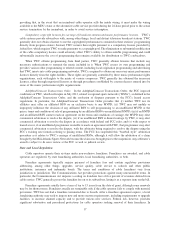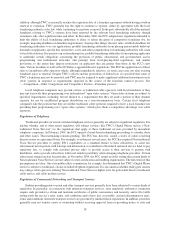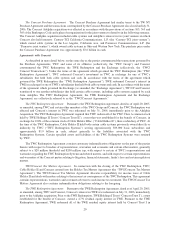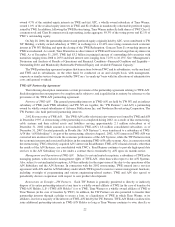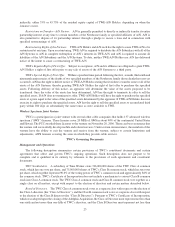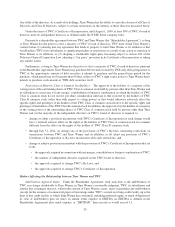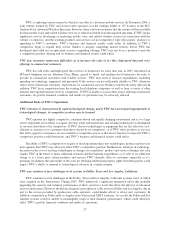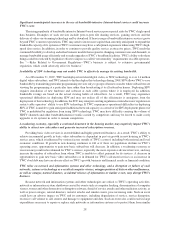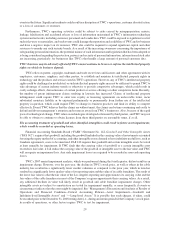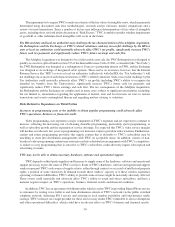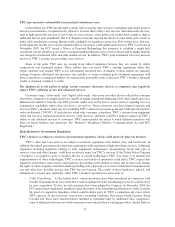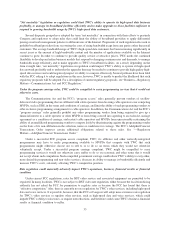Time Warner Cable 2007 Annual Report Download - page 29
Download and view the complete annual report
Please find page 29 of the 2007 Time Warner Cable annual report below. You can navigate through the pages in the report by either clicking on the pages listed below, or by using the keyword search tool below to find specific information within the annual report.four-fifths of the directors. As a result of its holdings, Time Warner has the ability to cause the election of all Class A
Directors and Class B Directors, subject to certain restrictions on the identity of these directors discussed below.
Under the terms of TWC’s Certificate of Incorporation, until August 1, 2009, at least 50% of TWC’s board of
directors must be independent directors as defined under the NYSE listed company rules.
Pursuant to a shareholder agreement between TWC and Time Warner (the “Shareholder Agreement”), so long
as Time Warner has the power to elect a majority of TWC’s board of directors, TWC must obtain Time Warner’s
consent before (1) entering into any agreement that binds or purports to bind Time Warner or its affiliates or that
would subject TWC or its subsidiaries to significant penalties or restrictions as a result of any action or omission of
Time Warner or its affiliates; or (2) adopting a stockholder rights plan, becoming subject to section 203 of the
Delaware General Corporation Law, adopting a “fair price” provision in its Certificate of Incorporation or taking
any similar action.
Furthermore, so long as Time Warner has the power to elect a majority of TWC’s board of directors, pursuant
to the Shareholder Agreement, Time Warner may purchase debt securities issued by TWE only after giving notice to
TWC of the approximate amount of debt securities it intends to purchase and the general time period for the
purchase, which period may not be greater than 90 days, subject to TWC’s right to give notice to Time Warner that it
intends to purchase such amount of TWE debt securities itself.
Protections of Minority Class A Common Stockholders. The approval of the holders of a majority of the
voting power of the outstanding shares of TWC Class A common stock held by persons other than Time Warner and
its subsidiaries is necessary for any merger, consolidation or business combination in which the holders of TWC
Class A common stock do not receive per share consideration identical to that received by the holders of TWC
Class B common stock (other than with respect to voting power) or that would otherwise adversely affect the
specific rights and privileges of the holders of the TWC Class A common stock relative to the specific rights and
privileges of the holders of the TWC Class B common stock. In addition, the approval of (i) the holders of a majority
of the voting power of the outstanding shares of TWC Class A common stock held by persons other than Time
Warner and (ii) the majority of the independent directors on TWC’s board of directors is required to:
• change or adopt a provision inconsistent with TWC’s Certificate of Incorporation if such change would
have a material adverse effect on the rights of the holders of TWC Class A common stock in a manner
different from the effect on the rights of the holders of TWC Class B common stock;
• through July 31, 2011, (a) change any of the provisions of TWC’s By-laws concerning restrictions on
transactions between TWC and Time Warner and its affiliates or (b) adopt any provision of TWC’s
Certificate of Incorporation or By-laws inconsistent with such restrictions; and
• change or adopt a provision inconsistent with the provisions of TWC’s Certificate of Incorporation that set
forth:
• the approvals required in connection with any merger, consolidation or business combination of TWC;
• the number of independent directors required on the TWC board of directors;
• the approvals required to change TWC’s By-laws; and
• the approvals required to change TWC’s Certificate of Incorporation.
Matters Affecting the Relationship between Time Warner and TWC
Indebtedness Approval Right. Under the Shareholder Agreement, until such time as the indebtedness of
TWC is no longer attributable to Time Warner, in Time Warner’s reasonable judgment, TWC, its subsidiaries and
entities that it manages may not, without the consent of Time Warner, create, incur or guarantee any indebtedness
(except for the issuance of commercial paper or borrowings under TWC’s current revolving credit facility up to the
limit of that credit facility, to which Time Warner has consented), including preferred equity, or rental obligations if
its ratio of indebtedness plus six times its annual rental expense to EBITDA (as EBITDA is defined in the
Shareholder Agreement) plus rental expense, or “EBITDAR,” then exceeds or would exceed 3:1.
24





